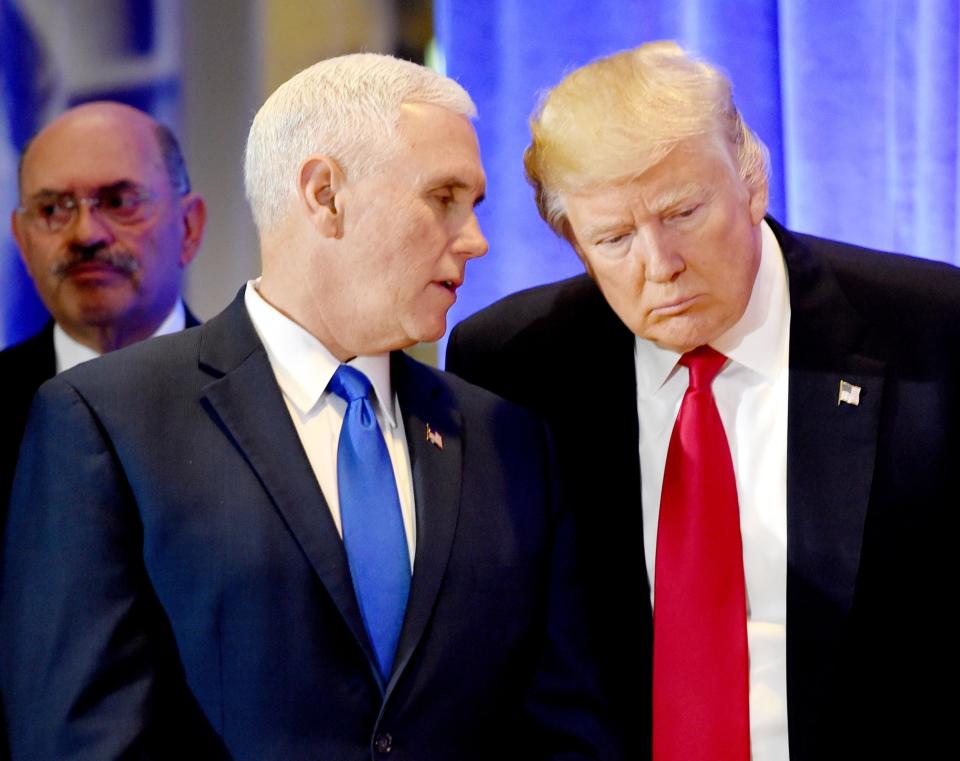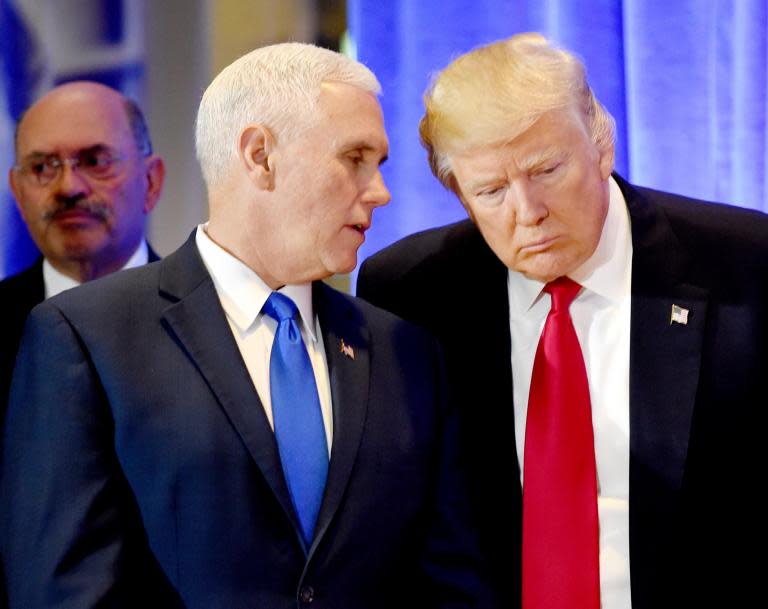Allen Weisselberg: Why Trump’s 'eyes and ears' money man could be next in the line of fire
In testimony before Congress this week, Michael Cohen cast himself as a central figure in schemes that could threaten the presidency of Donald Trump.
But Cohen said he didn’t work alone, unexpectedly mentioning by name the involvement of another member of Trump’s inner circle, Allen Weisselberg, more than 20 times. The revelations are set to intensify the scrutiny on Weisselberg, Trump’s unassuming 71-year-old chief financial officer, who already is a focus for federal prosecutors in New York.
On Wednesday, Cohen specifically identified Weisselberg as helping mastermind a strategy to mask reimbursements to Cohen for his payment to Stormy Daniels, the pornographic film actress who said she had an affair with Trump.
Rep. Elijah E. Cummings, D-Md., chairman of the House Committee on Oversight and Reform, said after Wednesday’s hearing that he “probably will” want to call additional witnesses, including Weisselberg, to gather additional evidence about the hush-money payment.
A Democratic official said the House Intelligence Committee anticipates calling Weisselberg to testify, as well.
[[gallery-0]]
Cohen said in the hearing that the payment was ordered by Trump, which violated campaign finance laws because it was intended to buy Daniels’ silence so that she could not hurt Trump’s prospects right before the election.
Cohen said he had paid Daniels with his own money, and then was repaid by the Trump Organisation.
“Allen Weisselberg made the decision that it should be paid over the 12 months so that it would look like a retainer,” Cohen told lawmakers, describing how reimbursements were made monthly.
Cohen submitted to Congress a copy of a $35,000 check — labelled exhibit 5b — that he said was one of those monthly payments.
It was signed by Weisselberg and Donald Trump Jr.
Weisselberg declined to comment through his lawyers. But it is clear why lawmakers and investigators might home in on him as they examine the Trump Organisation’s finances.
After Cohen pleaded guilty to campaign finance fraud and other crimes in August, federal prosecutors in Manhattan began focusing on what role the Trump Organisation and its executives, including Weisselberg, played in the campaign finance scheme, according to people briefed on the matter.
As part of the investigation, Weisselberg was granted limited immunity to testify before a federal grand jury last year. But there has been no indication that he has cooperated with prosecutors.
Weisselberg, an accountant, began his career doing the books for Trump’s father in a dingy building in Brooklyn. For decades, he has represented Trump on paperwork for everything from complex real estate deals to the operations of the antique carousel in Central Park, which the Trump Organisation runs.
In 2015, a lawyer representing students who alleged they were defrauded by Trump’s education venture, Trump University, questioned Weisselberg during a deposition, describing him as “Mr. Trump’s eyes and ears for his investments.”
Weisselberg replied, “Am I his eyes and ears? From an economic standpoint,” court records show. In 2016, Trump settled the case for $25m.
Corey Lewandowski, a former Trump campaign official, wrote in a book that he co-authored, “Let Trump be Trump” that Weisselberg “knows of every dime that leaves the building.”
Aside from Weisselberg, several other Trump associates may now be asked to testify before the House in the wake of Cohen’s hearing, including three executives at the Trump Organisation: Matthew Calamari, Alan Garten and Ronald C. Lieberman.
But Cummings said the committee would have to proceed carefully to avoid interfering with the investigation by federal prosecutors in the special counsel’s office and the U.S. attorney’s office in Manhattan.
Still in an indication of what may come, Cummings has sent letters to two lawyers he said were involved in preparing Trump’s federal financial disclosure filing, which originally omitted payments he made to reimburse Cohen for the payment to Daniels.
The letters requested that the lawyers, Sheri A. Dillon and Stefan C. Passantino, appear for interviews with the committee in March.
Dillon is a tax lawyer who represents Trump. Passantino was a deputy White House counsel at the time focused on ethics, but has since left and now advises the Trump Organisation on how to deal with House investigations.
Weisselberg has previously been questioned under oath, in a lawsuit filed last year by the New York attorney general against the Trump Foundation, Trump’s charitable organisation, where he served as treasurer. In late December, the foundation was dissolved after the attorney general accused it of fraud.
The US attorney’s office in Manhattan and the New York attorney general’s office declined to comment.
Weisselberg’s involvement in the hush money payment to Daniels first surfaced last year, when federal prosecutors seized recordings from Cohen’s office. On one of the recordings, Cohen was heard saying, “I’ve spoken to Allen Weisselberg about how to set the whole thing up.”
For his part, Trump has expressed confidence that Weisselberg will not turn on the president.
“100 percent he didn’t,” Trump told reporters for Bloomberg when asked last year whether Weisselberg had betrayed him. “He’s a wonderful guy.”
Others are not so certain.
“I am sure Allen does not want to hurt Donald, I am sure there is an affection there,” said Barbara Res, a former executive with the Trump Organisation who is a critic of the president. “But he’s in a terrible position — and Donald put him there.”
Aside from an awkward cameo on the second season of Trump’s television show, “The Apprentice,” Weisselberg has until recently stayed out of the limelight, focusing on serving his boss.
In his books and in interviews, the president has described Weisselberg as his go-to man, whether it was to help pick carpet swatches for a development, or to strong-arm firms with which he contracted.
In Cohen’s testimony Wednesday, Trump’s reliance on his CFO was on display. When it came to paying back his fixer for the hush money, Cohen said the president turned to Weisselberg.
“He acknowledged to Allen that he was going to pay the $130,000,” Cohen said, “And that Allen and I should go back to his office and figure out how to do it.”
The New York Times


